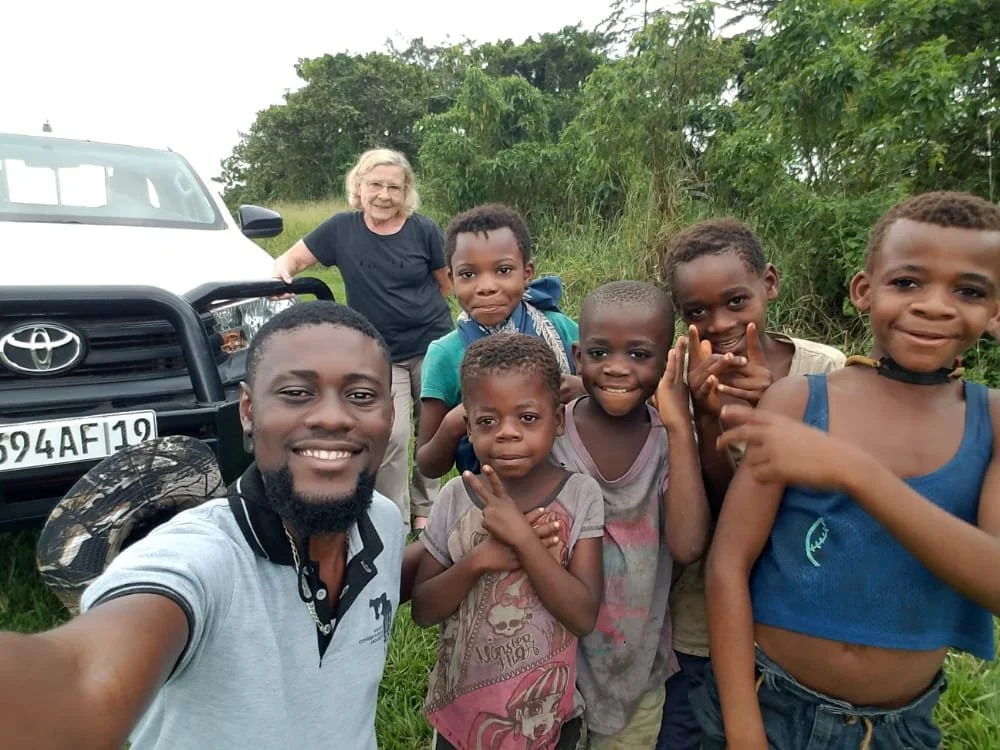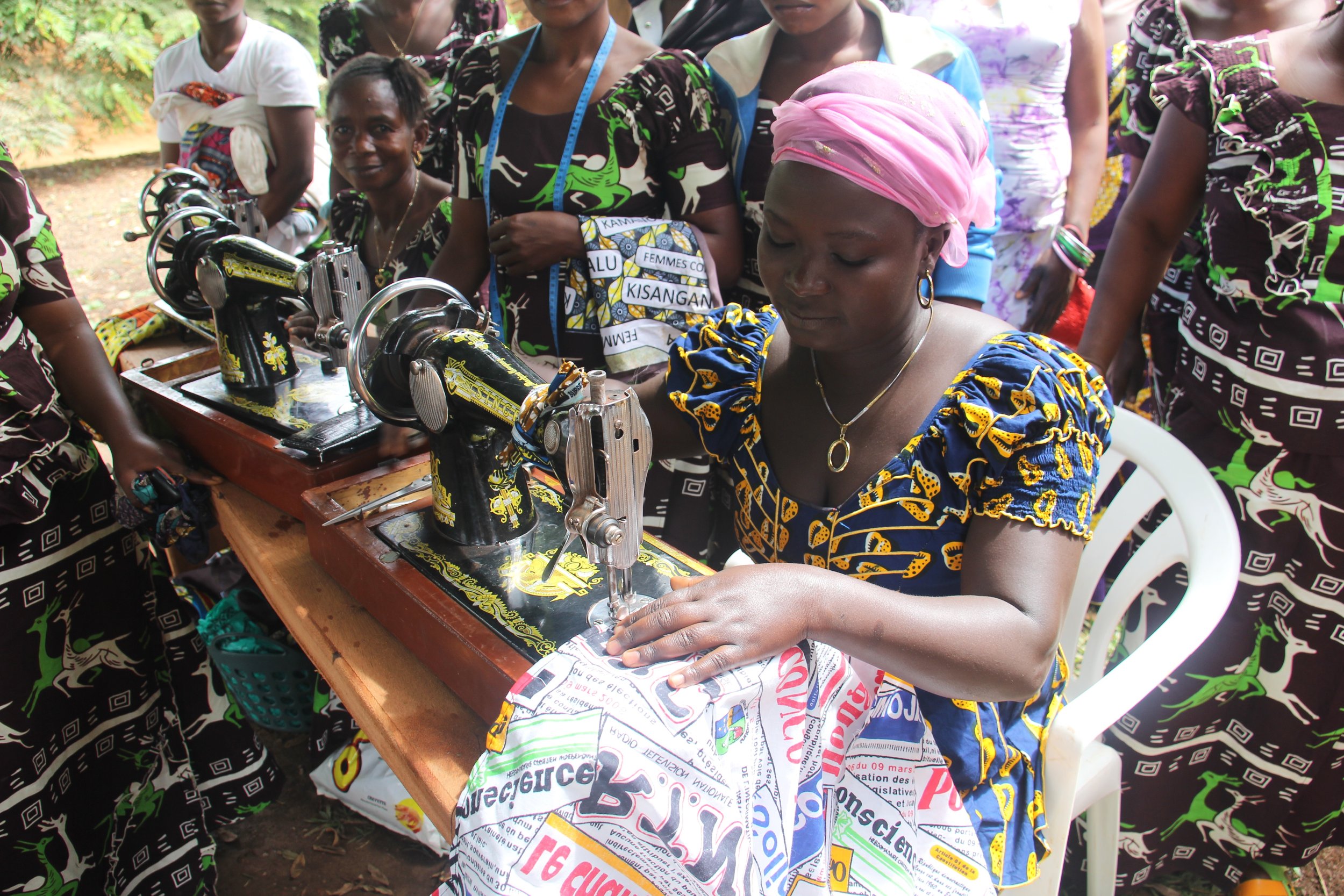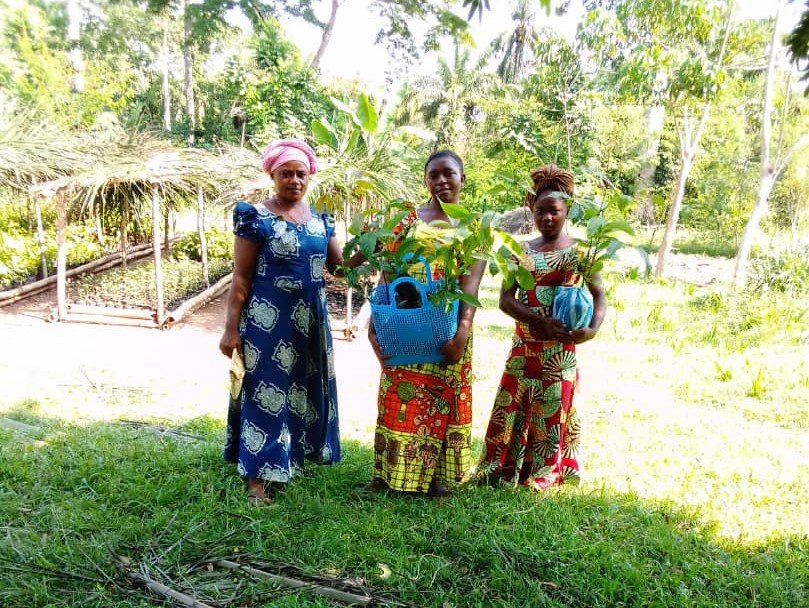
Community Assistance
Agroforestry, Women’s Groups, Healthcare
Empowering communities to protect okapi
Okapi Conservation Project works with partners and community leaders to provide broad-based community assistance and engagement — building and supplying schools and health clinics, providing food security for families through training and capacity building, establishing women’s empowerment initiatives, developing freshwater sources, and providing medical care to ICCN ecoguards, OCP staff, WCS staff and community members. Conservation education paired with these assistance programs enlightens communities to the importance of protecting the environment and being active stewards of their natural heritage. When feasible, sporting events, namely football/soccer, are used to engage communities, foster cooperation, and disseminate critical messages to all the participants on protecting the forest ecosystem.
Agroforestry
A rapidly growing regional human population made up of people fleeing violence in the eastern part of the country increases pressure on forest resources. Destructive small-scale slash and burn agricultural practices in and around the Reserve is the number one threat to the okapi’s rainforest home.
Through our agroforestry program, OCP promotes sustainable farming practices while reducing negative impacts of expanding agriculture into the complex and delicate Ituri Forest ecosystem. By introducing improved farming methods and techniques, the program improves food security for families by increasing the amount of food produced on the same plot of land for many years while reducing or eliminating the need to encroach further into the forest. What’s more, the program’s success is a key to making inroads into pockets of the Reserve that have not previously been receptive to broader conservation efforts. Assisting communities to improve their basic living requirements decreases the need for young people to be involved in illegal activities like mining, poaching, and logging to help support the needs of their families.
OCP supports six nurseries in and around the Reserve in the villages of Epulu, Mambasa, Niania, Biakato, Wamba and Mungbere (added in 2022). These nurseries provide seedlings of nitrogen-fixing trees and native fruit and nut-producing trees for farmers to promote sustainable agriculture. The nurseries also grow native tree seedlings that are given to students to plant around their schools and in abandoned fields — a useful and educational practice that teaches the value of forest conservation to schoolchildren. All our nurseries employ local people to hand collect seeds and head-starting each seedling for distribution. Each year, we produce and distribute over 70,000 trees and intend to increase that number as the nurseries improve production techniques.
In the Democratic Republic of Congo, National Tree Day is celebrated at the end of each calendar year coinciding with the end of the long rainy season. Celebrations are organized in villages to involve students in reforestation projects around the area, and by reforesting the areas around their schools, trees eventually grow to provide shade that helps cool the classrooms. The trees also provide habitat corridors and food sources for native wildlife too, especially primates. More importantly, involving students in reforestation projects teaches them the importance of conservation efforts and that they can really make a difference in their own communities.
Women's Groups
Since 2006, Okapi Conservation Project has supported the empowerment of women through five women’s groups across the Reserve. Women are influential members of the community, filling many roles essential to survival in this challenging landscape. They have been open and supportive of our conservation efforts in the Ituri Forest, and in order to provide them with a larger voice in the community, we support their goals and endeavors for economic growth. By providing materials, sewing machines, training and administrative assistance to the women, they can generate additional income by making and selling items such as school uniforms, clothing, napkins and embroidery in the local markets. In 2020, the women adapted to the government-imposed restrictions around COVID-19 by making face masks which they supplied to those in need and sold the surplus for additional income. Profit from the sale of their products goes into a communal fund used for living expenses of the members including, healthcare, household repairs and children’s education.
Traditionally most of the women’s groups gather outside, where their ability to work is subject to inclement weather, but OCP is working to change that. We built our first women’s centers over the past few years — Mambasa in 2019 and Epulu in 2021. Here, women are free to meet and work regardless of weather conditions. The centers also provide a secure place for women to store their materials and equipment. Since being opened, the use of the centers has become vital for increasing the amount and diversity of items the women can make thus increasing each women’s share of the income. Because of the success of the buildings in Mambasa and Epulu, we are raising funds to construct a building in each of the three remaining towns where our women’s groups are located.
Healthcare
Okapi Conservation Project operates the Okapi Dispensary in Epulu, providing healthcare to the ICCN ecoguards, OCP staff, WCS staff and their families, residents of Epulu, and the indigenous Mbuti. The dispensary features a main care center, a recovery wing, and a maternity ward. Behind the Clinic is a separate building for the Mbuti that can accommodate their cultural necessity of an open-air fire where they sleep. The dispensary has a staff of eight that sees thousands of patients each year, treating injuries and mild illness, prescribing medication, and delivering babies. These services are important to maintain a healthy workforce and family members that produce a sense of community and improve morale.
Our team purchases supplies for the Okapi Dispensary and the over 20 rural healthcare centers in villages around the Reserve. The medicines and medical materials are notoriously difficult to obtain in such a remote area and our team must travel hundreds of kilometers each month to large population centers to source the large quantities of materials we need to care for the thousands of people that seek help at the clinics.

Make a Contribution
Support Okapi Conservation Project today to help protect the endangered okapi and their rainforest home.













